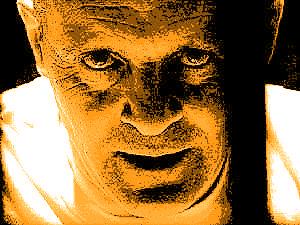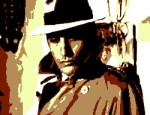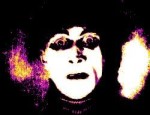Film Review
"A census taker once tried to test me. I ate his liver with some fava
beans and a nice chianti..." With these immortal lines Anthony
Hopkins supplanted Anthony Perkins as the creepiest horror villain the
movies have so far given us and elevated what might have been a
run-of-the-mill police procedural thriller to the status of a modern
horror classic.
The Silence of
the Lambs is a brilliantly executed study in psychotic evil, all the more
so for Hopkins' darkly compelling portrayal of the face-eating nutcase
Hannibal Lecter, which combines an urbane charm with a pure demonic
nastiness. This is not Hannibal's first screen outing - he had
already featured in Michael Mann's
Manhunter
(1986), played by Brian Cox - but it is his most memorable, thanks to
the manic intensity that Hopkins brings to the part, tastily garnished
in a black comedic undertone.
The Silence of the Lambs was
both acclaimed and vilified when it was first screened in 1991.
The critics and audiences loved it, one of the few contemporary horror
films that stood up well alongside the American horror classics of the
previous decade, but it was vehemently condemned by groups representing
women and transsexuals, who found the film dangerously offensive.
Although the film does undoubtedly merit censure for its caricatured
portrayal of a transsexual as a deranged serial killer (the film's only weak
point), it certainly does not show women in a negative light. In
Clarice Starling, authentically played by Jodie Foster, the film gives
us one of cinema's most convincingly ballsy heroines, a character who
not only wins the day through her courage and intellect, but who does
so without any of the tedious macho posturing to which her male
counterparts are prone. In a startling and long-overdue inversion
of the psycho-thrillers of the past,
The
Silence of the Lambs shows that not only can women be more
courageous, resilient and efficient than the male sex, but also morally
superior. Such positive portrayals of women in thrillers prior to
this film are extremely hard to come by, so in this respect it marked
something of a watershed, one of the most significant pro-female movies
in American cinema.
Anthony Hopkins and Jodie Foster were both justly rewarded with Oscar
wins for their gripping performances in this film. Although
Hopkins is on screen for bearly sixteen minutes, he dominates the film
to such an extent that you could swear he was in virtually every
scene. His sequences with Foster provide the film with its most
chilling and compelling moments, Lecter's slow, remorseless dissection
of Starling's persona proving to be every bit as morbidly fascinating
and scary as the gruesome fate that awaits Buffalo Bill's
victims. The film won three other Oscars, in the categories of
Best Picture, Best Director and Best screenplay, and Hopkins and Foster
also won BAFTAs for their performances. Masterfully directed by
Jonathan Demme and sustained by a taut screenplay
adapted from a Thomas Harris novel,
The
Silence of the Lambs stands as possibly the greatest thriller of
the 1990s, although its viscerally gruesome horror content and
nerve-wracking denouement may prove to be too much of an ordeal for
some...
© James Travers 2010
The above content is owned by frenchfilms.org and must not be copied.
Film Synopsis
Clarice Starling is undergoing the rigours of an FBI training course
when she is recruited by Jack Crawford, head of the Bureau's Behavioral
Science Unit, to help track down a serial killer. Nicknamed
Buffalo Bill, the killer has already claimed the lives of five women,
disposing of their bodies in lakes and rivers after removing their
skins. Crawford hopes to identify the killer through his
psychological profile, which he intends to elicit by eavesdropping on
conversations between Starling and another psychopath who is being held
in an asylum, Dr Hannibal Lecter. Once a well-regarded
psychiatrist, Lecter became notorious for his cannibalistic habits,
which involve biting into the faces of his victims like a savage
dog. A man of great intelligence and cunning, Lecter enjoys
playing with Starling but offers few tangible clues to the identity of
Buffalo Bill. When the Senator's daughter is abducted, Crawford
authorises Starling to offer Lecter a transfer to a more comfortable
state prison if he cooperates in the capture of the killer.
Lecter agrees to help, but on the condition that he can probe Starling
on her troubled past...
© James Travers
The above content is owned by frenchfilms.org and must not be copied.



